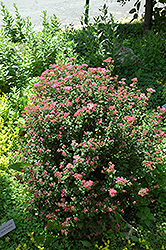It's all about ...
plants

Crispleaf Spirea
Spiraea bullata 'Crispifolia'
Height: 18 inches
Spread: 18 inches
Sunlight:
![]()
Hardiness Zone: 4a
Description:
A refined small shrub with a compact yet upright habit of growth, very crinkly, toothy tiny leaves and deep pink flowers in late spring; it all adds up to a versatile garden dwarf, an excellent specimen for the rock garden
Ornamental Features
Crispleaf Spirea features showy corymbs of rose flowers at the ends of the branches from late spring to early summer. It has attractive bluish-green deciduous foliage. The tiny twisted oval leaves are highly ornamental and turn an outstanding coppery-bronze in the fall.
Landscape Attributes
Crispleaf Spirea is a dense multi-stemmed deciduous shrub with a mounded form. It lends an extremely fine and delicate texture to the landscape composition which should be used to full effect.
This is a relatively low maintenance shrub, and is best pruned in late winter once the threat of extreme cold has passed. It is a good choice for attracting butterflies to your yard, but is not particularly attractive to deer who tend to leave it alone in favor of tastier treats. It has no significant negative characteristics.
Crispleaf Spirea is recommended for the following landscape applications;
- Mass Planting
- Rock/Alpine Gardens
- General Garden Use
Planting & Growing
Crispleaf Spirea will grow to be about 18 inches tall at maturity, with a spread of 18 inches. It tends to fill out right to the ground and therefore doesn't necessarily require facer plants in front. It grows at a medium rate, and under ideal conditions can be expected to live for approximately 20 years.
This shrub should only be grown in full sunlight. It prefers to grow in average to moist conditions, and shouldn't be allowed to dry out. It is not particular as to soil type, but has a definite preference for acidic soils, and is subject to chlorosis (yellowing) of the foliage in alkaline soils. It is highly tolerant of urban pollution and will even thrive in inner city environments. This is a selected variety of a species not originally from North America.
This plant is not reliably hardy in our region, and certain restrictions may apply; contact the store for more information.
